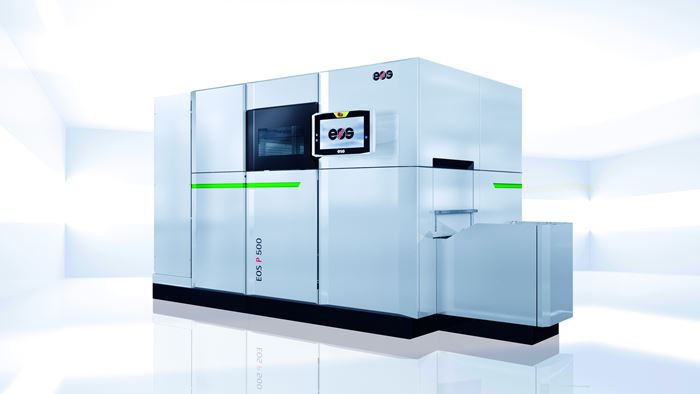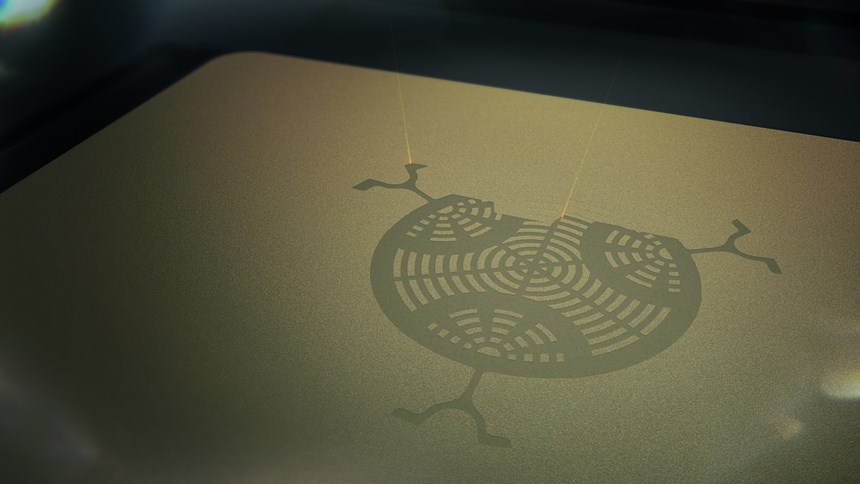EOS P 500 Intended for Polymer 3D Printing on Industrial Scale
The 3D printing system offers automation readiness and can process materials ranging to 300°C.
The EOS P 500 additive manufacturing (AM) system is designed for the mass production of polymer parts on an industrial scale. The system offers high efficiency for low cost-per-part, is automation ready, and can process polymer materials with operating temperatures ranging to 300°C.
According to the company, the EOS P 500 builds twice as quickly as the EOS P 396 laser sintering machine, thanks to a dual-laser system for fusing the powder and a new recoater. The latter applies a new layer of powder to the building platform at a speed of 600 mm/sec. Material flow has also been optimized. In contrast to previous systems, the EOS P 500 preheats polymer material in advance, before it is applied on the build platform, reducing layer times. The system can also reuse all recycled powder for the next build job at higher fill rates, further increasing efficiency.
Preheating of the exchangeable frame before the build and cool-down of the used frame containing the manufactured part take place outside of the EOS P 500, further streamlining the workflow. Frames can be switched within 15 min. after a build job is completed. The system typically requires cleaning once per week and maintenance once per year. The total cycle times of the EOS P 500 have been improved by as much as 75 percent compared to the EOS P 396, the company says.
The EOSame feature homogenizes the energy input of the laser, ensuring high quality and reproducible part properties as well as dimensional accuracy across the complete build volume to support serial production.
Sensory and camera-based data evaluation helps to ensure quality. EOSConnect software gathers machine and production data, making it available in real time. The company also offers an intuitive app to visualize the data on a dashboard. The EOS P 500 is the first EOS system for polymer AM supported by the company’s EOSPrint 2 CAM tool, already used to support the company’s metal AM systems.
The EOS P 500 can process polymer materials ranging to 300°C, making it compatible with material classes such as PA6, PBT, PET, PPS and PEKK. A three-stage filter unit consisting of a cooling trap, fines filter and reactive coal filter counters material outgassing and article contamination. The first high-performance polymer to be available for the machine will be PEKK. EOS has signed a joint development agreement with Arkema to develop this material based on the Arkema Kepstan PEKK product line. Other collaborations with Evonic and BASF are underway to develop future polymer materials.
EOS has also announced that the first company to acquire the new EOS P 500 system will be Materialise.
Related Content
-
How AM Enables Cobot Automation for Thyssenkrupp Bilstein (Includes Video)
The shock absorber maker has responded to its staffing shortages through extensive use of collaborative robots. In-house 3D printing makes this possible by providing the related hardware needed to complete the cobot-automated cells.
-
Video: 3D Printed Tooling Eases Cobot Integration
At NPE 2024, Universal Robots and EMI Corporation highlighted how 3D printed end effectors, fixtures and more enable adoption of collaborative robots.
-
How Avid Product Development Creates Efficiencies in High-Mix, Low-Volume Additive Manufacturing
Contract manufacturer Avid Product Development (a Lubrizol company) has developed strategies to streamline part production through 3D printing so its engineering team can focus on development, design, assembly and other services.















